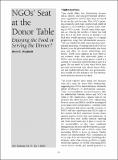| dc.contributor.author | Hudock, Ann C. | en |
| dc.date.accessioned | 2016-02-01T14:42:40Z | |
| dc.date.available | 2016-02-01T14:42:40Z | |
| dc.date.issued | 01/07/2000 | en |
| dc.identifier.citation | Hudock, A., C. (2000) NGOs' Seat at the Donor Table: . IDS Bulletin 31(3): 14-18 | en |
| dc.identifier.issn | 1759-5436 | en |
| dc.identifier.uri | https://opendocs.ids.ac.uk/opendocs/handle/20.500.12413/8796 | |
| dc.description.abstract | Summary This article argues the case for three types of reform that would enable the relationship between NGDOs and their official donors to move closer to that predicated on ‘partnership’ — a relational condition that, despite public rhetoric and policy pronouncements, too seldom exists today. Barriers to partnership exist because of, amongst others, donor preference for contracting, cut?backs in their field staff and reporting requirements that orient NGDO accountability away from intended beneficiaries. Without substantial reform, the supposed greater presence and capability of NGDOs will not translate into structural influence on the mainstream of aid system behaviour. Unless donor institutions change, NGDOs will remain servers rather than diners at the donor dinner table. | en |
| dc.format.extent | 5 | en |
| dc.publisher | Institute of Development Studies | en |
| dc.relation.ispartofseries | IDS Bulletin Vol. 31 Nos. 3 | en |
| dc.rights.uri | http://www.ids.ac.uk/files/dmfile/IDSOpenDocsStandardTermsOfUse.pdf | en |
| dc.title | NGOs' Seat at the Donor Table: | en |
| dc.type | Article | en |
| dc.rights.holder | © 2000 Institue of Development Studies | en |
| dc.identifier.doi | 10.1111/j.1759-5436.2000.mp31003002.x | en |

